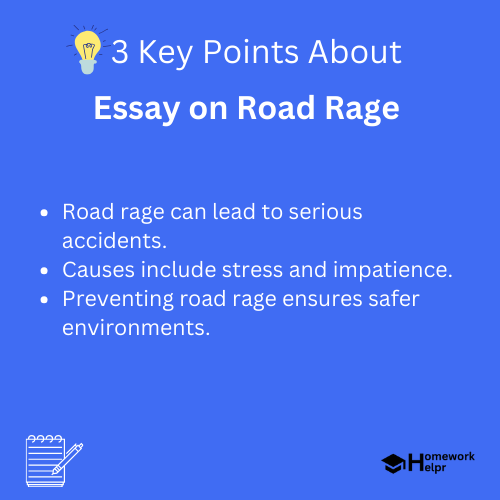📝 Summary
Road rage is a serious issue characterized by aggressive driving behaviors, often stemming from factors like stress, impatience, and distractions. It not only leads to dangerous situations but can also result in accidents, legal consequences, and emotional tolls on victims. To prevent road rage, drivers should prioritize calmness, avoid engaging with aggressive drivers, and practice safe driving habits. Educating oneself about the impact of driving behavior and promoting empathy can help cultivate a respectful driving environment, ultimately working towards a safer road for all.}
Essay on Road Rage for Students and Children
Road rage is a term that captures a wide range of frustrating attitudes and aggressive behaviors exhibited by drivers on the road. It occurs when a driver loses their temper and reacts irrationally, often resulting in dangerous situations. Understanding road rage is crucial, especially for students and children who may soon become drivers themselves. This essay delves into the causes, consequences, and prevention of road rage while providing helpful insights that emphasize the importance of safe driving practices.
What Is Road Rage?
Road rage is more than just a minor annoyance; it can escalate into serious confrontations or accidents. The term refers to aggressive driving behaviors that include yelling, gesturing, or even pursuing another driver out of anger. Drivers may experience frustration when stuck in traffic, blocked by slower vehicles, or distracted by other road users. These frustrations can lead to actions that put not only the aggressive driver but also innocent passengers and pedestrians in danger.
Definition
Aggressive driving: A type of driving behavior characterized by hostile actions, such as excessive speeding, tailgating, or weaving in and out of traffic.
Definition
Frustration: A feeling of annoyance or anger caused by being unable to achieve a goal or desire, typically when encountering obstacles or difficulties.
Causes of Road Rage
Understanding the causes of road rage is vital in preventing it. Here are some of the most common factors contributing to aggressive driving:
- Stress: Many drivers lead busy lives filled with responsibilities. This stress can compound in high-pressure situations like traffic jams.
- Impatience: Some people have a low tolerance for waiting. This impatience can quickly transform into aggression when they feel another driver is delaying them.
- Distractions: Texting, talking on the phone, or even adjusting the radio can divert attention from the road and escalate irritability.
- Recklessness: Some individuals have a lack of consideration for other drivers, which can lead to aggressive behaviors.
❓Did You Know?
Did you know that studies have shown that men are more likely to exhibit road rage than women? This highlights the differences in driving behaviors between genders!
Consequences of Road Rage
The consequences of road rage can be severe and far-reaching. Not only do they involve physical harm, but they can also lead to legal repercussions. Here are some notable consequences:
- Accidents: Road rage can lead to high-speed collisions, injuries, or fatalities. Aggressive driving increases the likelihood of serious accidents.
- Legal implications: Drivers exhibiting road rage may face fines, points on their driving records, or even jail time if their actions lead to serious harm or fatality.
- Emotional impact: The emotional toll of aggressive driving can extend beyond the moment. Victims of road rage may suffer from anxiety and fear while driving.
Examples
For instance, if a driver aggressively tailgates another car, it may cause the lead driver to panic and make sudden decisions that could result in an accident.
Examples
Another example is when a driver engages in a heated exchange with another driver at a stoplight, which may escalate to dangerous behaviors like chasing each other through intersections.
How to Prevent Road Rage
Preventing road rage is crucial for ensuring the safety of everyone on the road. Here are practical tips that students and children can adopt to cultivate more respectful driving habits:
- Stay Calm: Before driving, take a few minutes to relax and center yourself. Approaching drives calmly can help mitigate frustration.
- Avoid Engaging: If another driver is aggressive, do not respond with anger. Instead, focus on your driving and allow them to pass when safe.
- Plan Ahead: Give yourself plenty of time to reach your destination, which can minimize late arrivals and rash decisions.
- Use Relaxation Techniques: Learn simple relaxation techniques, such as deep breathing or listening to calm music, to alleviate anxiety and frustration.
Importance of Safe Driving Practices
The foundation of preventing road rage lies in promoting and practicing safe driving habits. This can involve several components:
- Adhering to Traffic Rules: Following speed limits, using turn signals, and stopping at red lights are essential to avoid confrontations with other drivers.
- Being Courteous: Simple gestures like letting other cars merge or waving to thank others for their patience can diffuse tension.
- Education: Awareness of one’s driving behavior and its impact on others is vital. Educational programs can provide valuable insights into safe driving.
- Encouraging Empathy: Understanding that every driver has their story can help mitigate feelings of frustration. Practicing empathy can lead to kinder road interactions.
Conclusion
In conclusion, road rage is a serious issue that has the potential to cause harm to all road users. By understanding what road rage is, its causes and consequences, students and children can become more mindful of their behavior behind the wheel. By implementing practical strategies to prevent road rage and emphasizing the importance of safe driving practices, we can work together to create a safer driving environment for everyone. Remember, when you’re on the road, it is always best to choose patience and understanding over aggression and anger.

Related Questions on Essay on Road Rage for Students and Children
What is road rage?
Answer: Road rage refers to aggressive driving behaviors.
What causes road rage?
Answer: Common causes include stress and impatience.
How can road rage be prevented?
Answer: Stay calm and avoid engaging with aggressors.
What are the consequences of road rage?
Answer: Consequences include accidents and legal issues.
